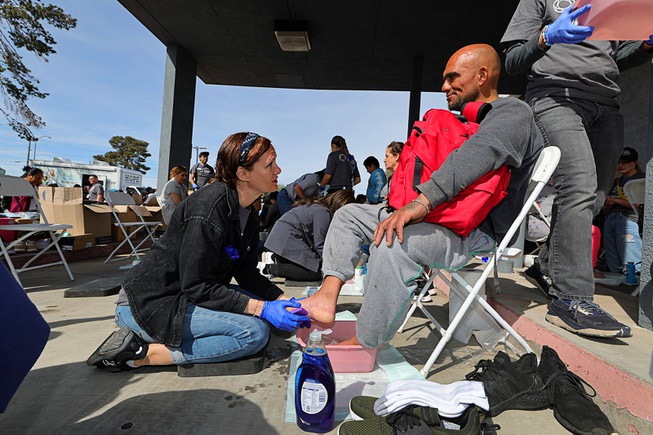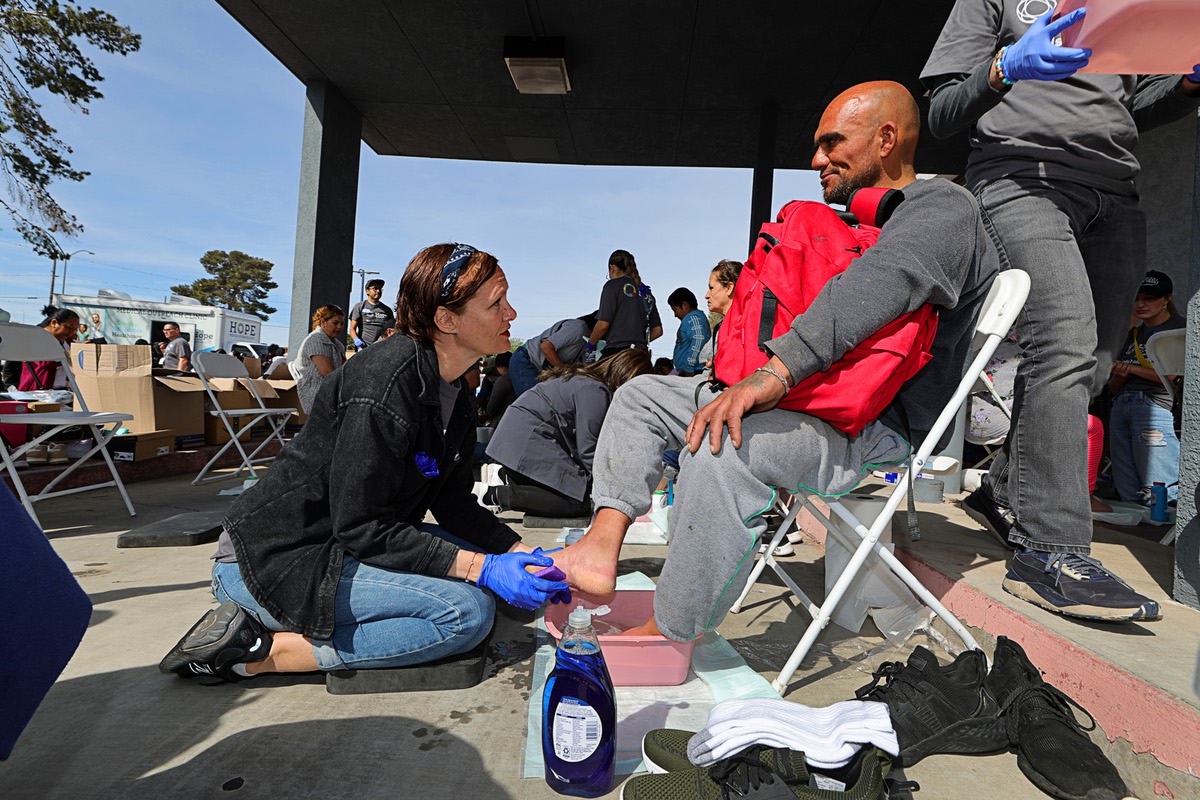
Steve Marcus
Volunteer Cecelia Figueroa washes the feet of Raymond Baca during a Good Friday community health event at Chicanos Por La Causa Nevada Friday, March 29, 2024.
Saturday, March 30, 2024 | 8:58 a.m.
Clean shoes, medical checkups and a meal were provided to Las Vegas residents at a community health clinic at Chicanos Por La Causa Nevada to assist underserved communities on Friday morning.
The event featured a mobile medical unit, vaccinations, two health workshops and other activities. Feminine hygiene products, toys and school supplies were just some of the many supplies given out for free to attendees.
Chicanos Por La Causa opened its Las Vegas office in 2010 to “drive political and economic empowerment,” according to its website. The group hosted the event in partnership with several other community organizations, including Hope Christian Health Center, which provided the mobile medical unit as well as free feet washing, new socks and shoes for attendees.
The foot washing not only had spiritual significance on Easter weekend, but also served as a way for attendees to have their feet checked for any medical concerns. Foot issues like loss of hair, blisters and numbness or tingling can all be signs of diabetes or other issues, according to the Center for Disease Control and Prevention.
The event also included the first in what will be a series of health information and prevention workshops hosted by Chicanos Por La Causa Nevada. The workshops, which were given in English and Spanish, focused on diabetes and hypertension, which affects Hispanic people in the United States disproportionately, according to the CDC.
While adults in the United States have a 40% chance of developing Type 2 diabetes, Hispanic or Latino adults in the U.S. are over 50% likely and are more likely to develop diabetes at a younger age. Complications from diabetes are also more likely to be more severe in Hispanic adults in the U.S., as diabetes-related kidney failure and vision loss are higher for them as opposed to the general population, according to the CDC.
“A lot of times our community members don’t have health insurance, so they can’t afford the medication for diabetes,” said Serafin Calvo, workforce and community development director for Chicanos Por La Causa Nevada. “So the next best thing is prevention, right? Don’t ever get it in the first place.”
For underserved communities who may struggle with access to healthcare, accurate information is even more important in ensuring healthy lives, Calvo said. And for those who do have chronic illnesses like diabetes but have limited access, services like Hope Christian Health Center that provide care without insurance and at adjustable pricing is crucial.
“Being able to provide that key information to avoid these chronic illnesses is key,” Calvo said. “But it has to be given by a trusted messenger. That’s the first thing.”
The mobile medical unit provided by the health center provided screenings for HIV, chiropractic exams and other medical procedures for attendees. Led by Medical Outreach Director Miles Adamson, the mobile medical unit is equipped with the same capabilities as a general practitioner’s office.
“We’re always out in the city, Adamson said. “We’re always trying to find places to be able to impact communities that don’t have ways of getting access to health — whether it’s because they can’t afford it, or because they can’t get transportation to that place.”
Adamson said the mobile medical unit has already provided care to over 200 people in March alone, and several attendees at the event waited in line to receive checkups and other services.
An attorney specializing in immigration law was also present at the event, meeting with attendees and referring them to services that could help them with deportation, family cases and visas.
Natalie Abad, an attorney with Handy Legal Services, said having legal aid at events like these is important because one of the greatest obstacles for immigrants is misinformation.
Abad said one of the most common misconceptions surrounding immigration law is that having a child over 21 will provide benefits to families. While in some cases it can, Abad said that is not always the case, which is why it is so important to meet with an expert.
“A lot of the time, there’s misinformation they go off of, like somebody told them something from somebody else,” Abad said. “Immigration is very specific to the person, so it’s very important that they get evaluated either by an organization or by an attorney, somebody who actually knows the process.”

